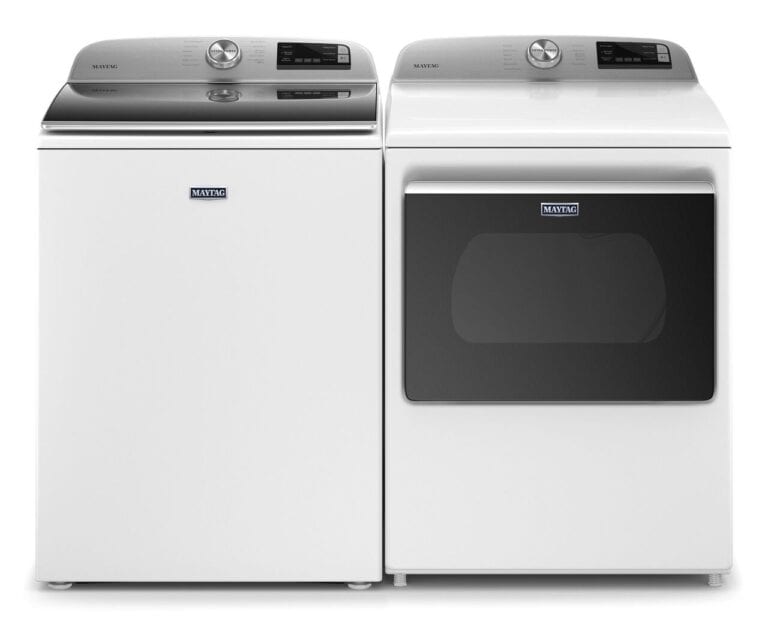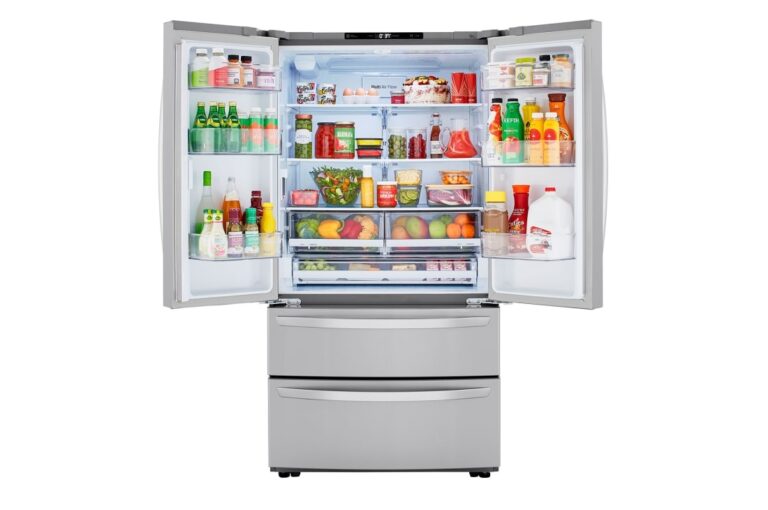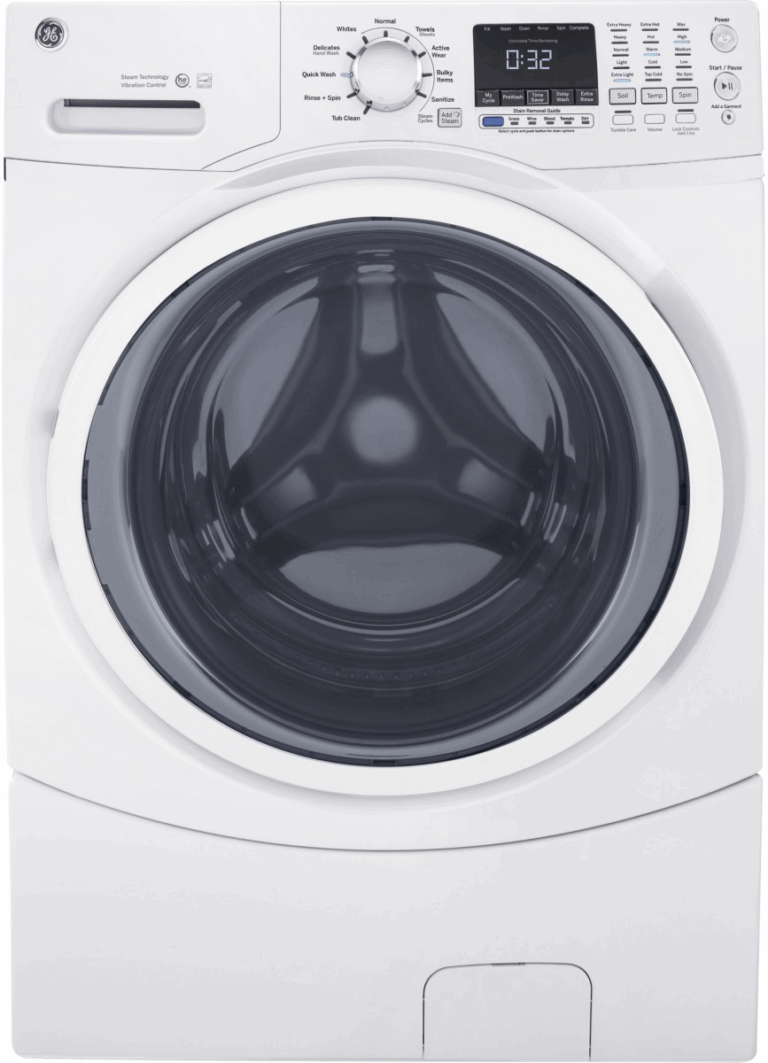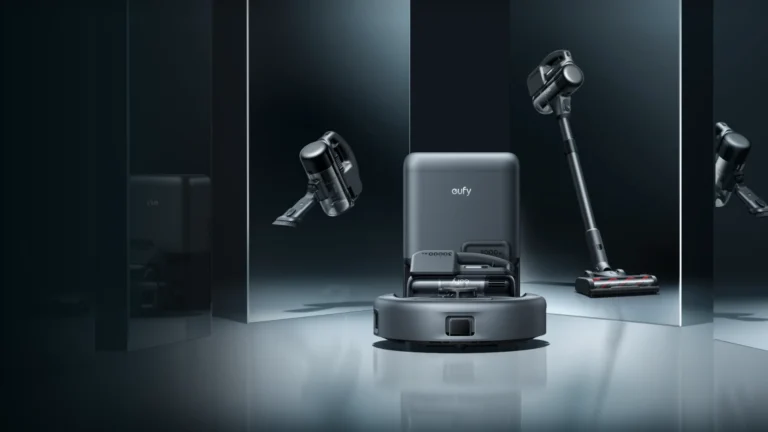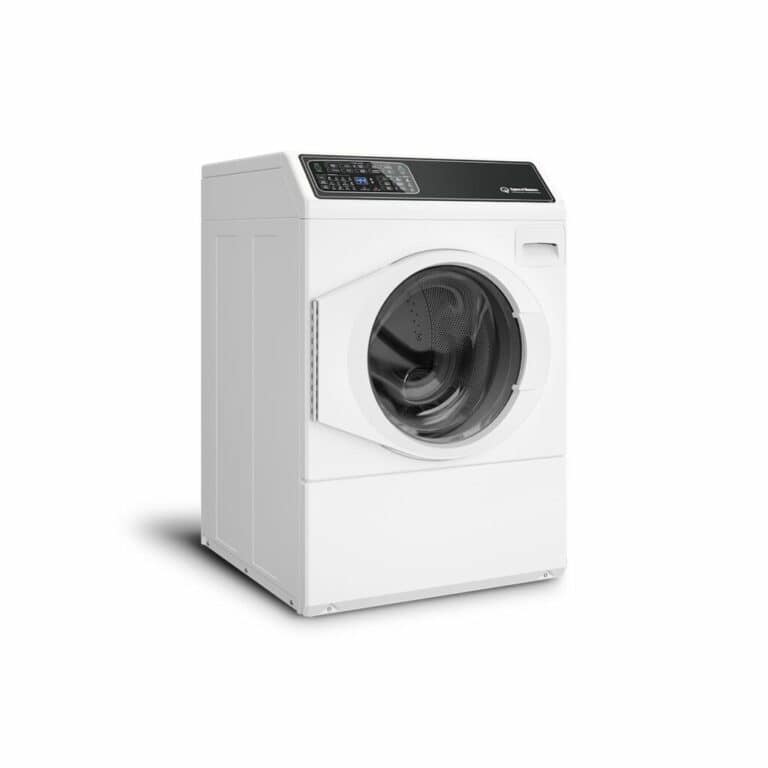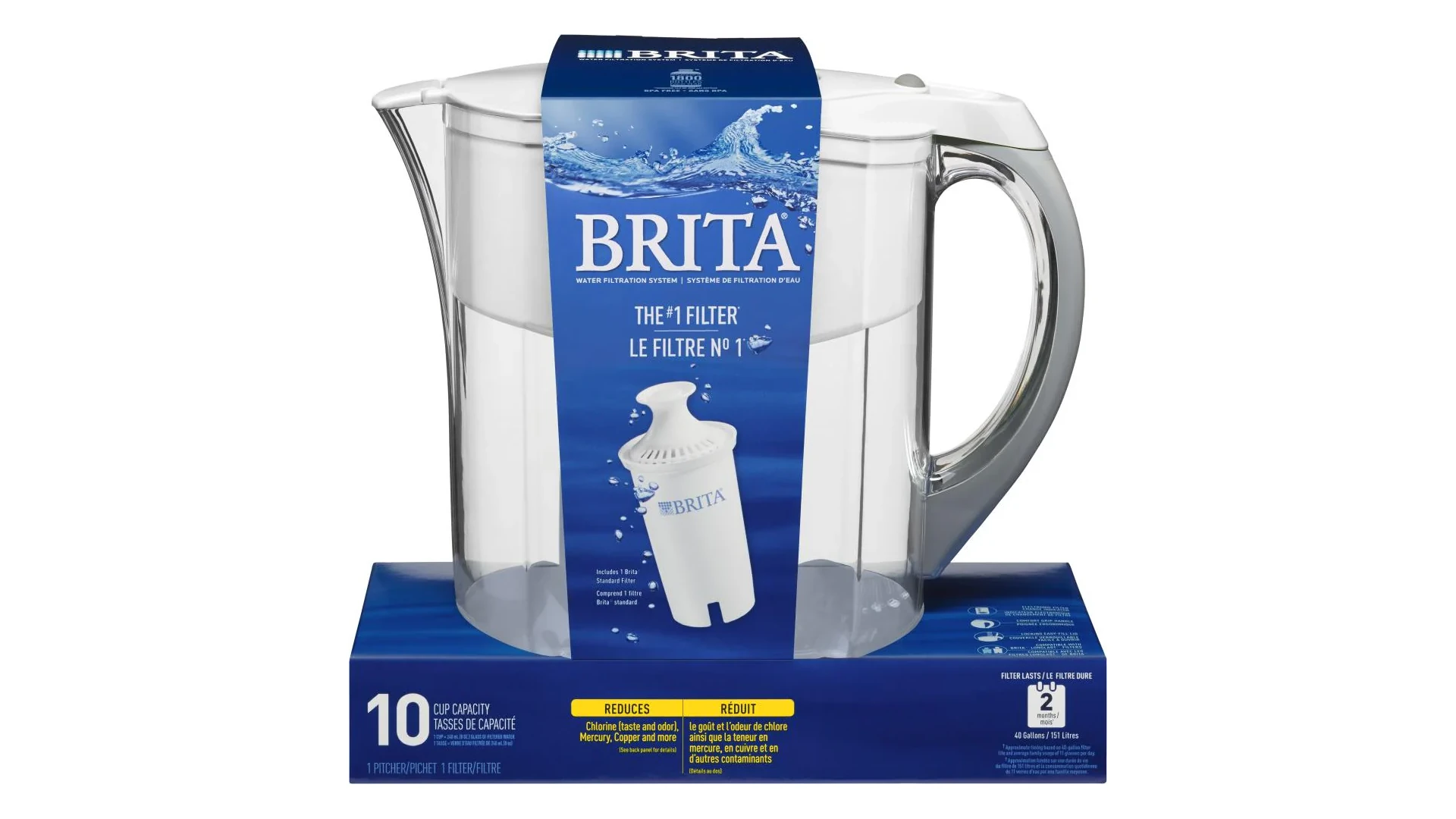
Clean, safe drinking water is essential for health and well-being. Water filters provide an effective way to remove contaminants and improve taste. These devices range from simple pitchers to advanced under-sink systems, offering options for every household need and budget.
Water filters use various methods to purify water. Common techniques include activated carbon filtration, reverse osmosis, and UV light disinfection. Each type targets different contaminants, from chlorine and lead to bacteria and viruses. Choosing the right filter depends on your local water quality and specific concerns.
When selecting a water filter, consider factors like filtration capacity, maintenance requirements, and certification. Look for filters certified by NSF International or the Water Quality Association. These ensure the product meets strict standards for contaminant reduction. We tested multiple water filters to find the best options for different households and water quality needs.
Top Water Filters For 2025
| Rank | Water Filter System | Key Features | Pros | Cons |
|---|---|---|---|---|
| 1 | AmazonBasics 10-Cup Pitcher | Affordable pitcher with multi-stage filtration for chlorine and heavy metal reduction. | Large capacity, WQA Gold Seal certified, BPA-free. | Slower filtration, tricky lid fit, basic filter change reminder. |
| 2 | Brita UltraMax Dispenser | 27-cup capacity dispenser for large households with reduced chlorine taste and odor. | Space-efficient, easy-pour spigot, filter replacement indicator. | Stiff dispenser control, potential for cracks if dropped, frequent filter replacements. |
| 3 | Brita UltraMax Elite | Enhanced dispenser reducing 30 contaminants, including lead, with large capacity. | Advanced filtration, space-efficient, reduces bottled water usage. | High upfront cost, regular filter replacements, may not fit all refrigerators. |
| 4 | Brita Metro Pitcher | Compact 6-cup pitcher ideal for small households. | Compact size, electronic filter indicator, chlorine odor reduction. | Small capacity, frequent filter changes, less durable plastic construction. |
| 5 | ZeroWater 32-Cup Dispenser | High-capacity dispenser with 5-stage filtration and TDS meter for purity monitoring. | Exceptional purification, integrated TDS meter, sleek design. | Slow filtration, frequent filter replacements, higher upfront cost. |
| 6 | Waterdrop 10UA Under Sink | Under-sink filter removing PFAS, chlorine, and more with quick installation. | Long-lasting filters, compact size, versatile use. | Only for cold water, may slightly reduce water flow, requires under-sink space. |
| 7 | Brita Everyday Elite Pitcher | 10-cup pitcher with SmartLight filter indicator and advanced contaminant reduction. | Removes 99% of lead, large capacity, easy to use. | Regular filter replacements, may not fit in smaller refrigerator doors, time-consuming setup. |
| 8 | ZeroWater 10-Cup Pitcher | Compact pitcher with 5-stage filtration and IAPMO certification for lead and PFOA/PFOS removal. | Includes TDS meter, thorough filtration, BPA-free construction. | Slow water flow, frequent filter changes, slightly bulky for some refrigerators. |
| 9 | PUR PLUS Faucet Filter | Faucet-mounted filter reducing 70 contaminants with easy installation. | Removes lead and microplastics, sleek design, filter change indicator. | May not fit all faucets, slower water flow, requires regular filter changes. |
| 10 | iSpring RO System | 6-stage under-sink reverse osmosis system with alkaline remineralization. | NSF certified, removes a wide range of contaminants, improves pH balance. | Requires professional installation for some users, regular maintenance, higher initial cost. |
Best Water Filters
We’ve compiled a comprehensive list of top-performing water filters to help you choose the right one for your home. Our selection includes a range of options from countertop pitchers to under-sink systems, all designed to remove impurities and improve taste. We’ve evaluated each filter based on effectiveness, ease of use, and value for money.
AmazonBasics 10-Cup Water Filter Pitcher
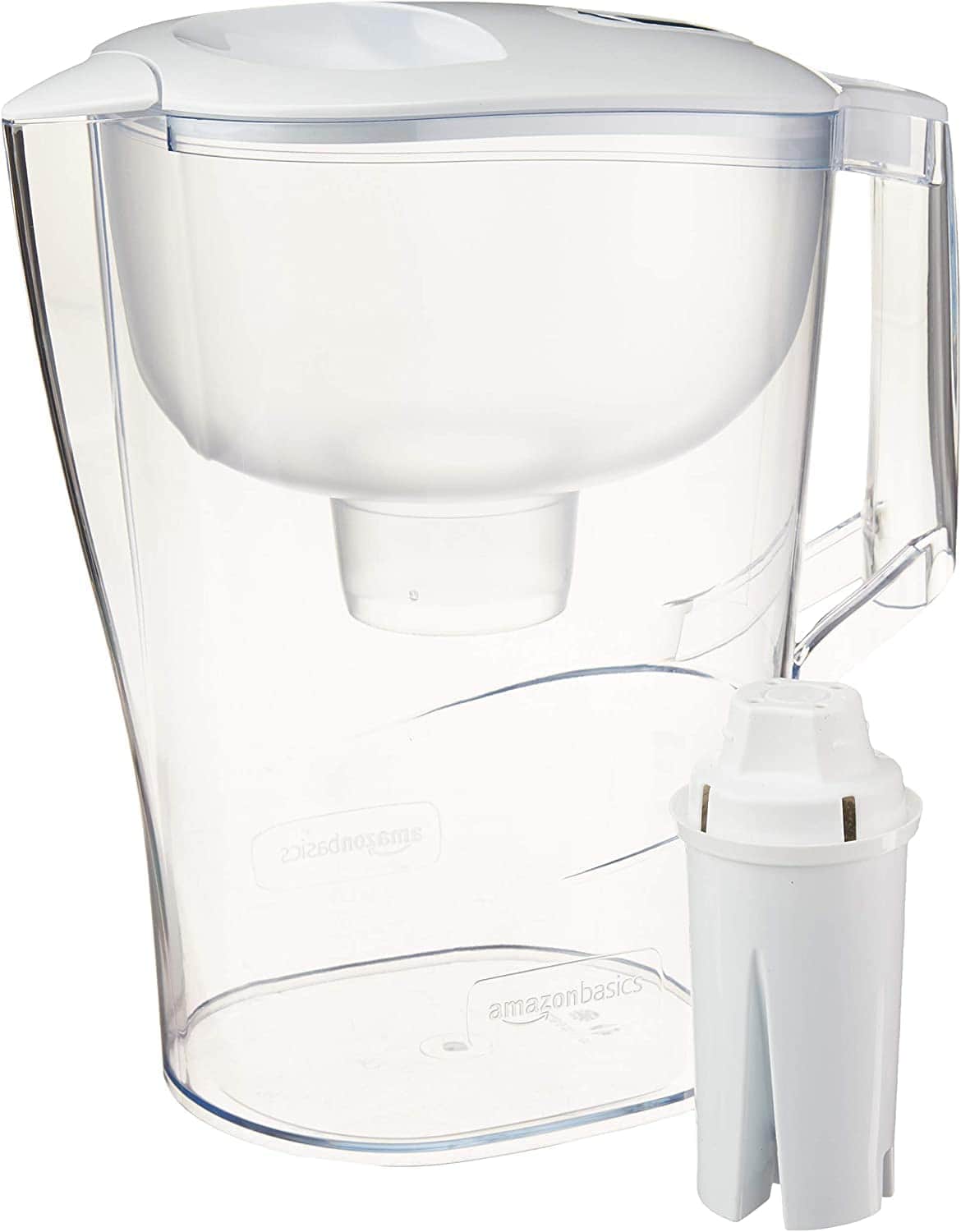
We recommend this affordable and efficient water filter pitcher for households seeking clean, great-tasting water.
Pros
- Large 10-cup capacity
- WQA Gold Seal certified
- Multi-stage filtration technology
Cons
- Slower filtration than some competitors
- Lid can be tricky to fit
- Filter change reminder could be more intuitive
We recently tried out the AmazonBasics 10-Cup Water Filter Pitcher, and it’s an impressive budget-friendly option. The pitcher holds enough water for three 24-ounce bottles, making it perfect for families or those who drink a lot of water throughout the day.
The filtration quality surprised us. It’s WQA Gold Seal certified and meets NSF/ANSI standards for reducing chlorine taste, copper, mercury, and benzene. We noticed a significant improvement in taste compared to tap water. The multi-stage filtration technology keeps water fresh for up to 40 gallons or about two months for an average household.
One minor drawback we encountered was the filtration speed. It’s a bit slower than some pricier models we’ve used. The lid also took some fiddling to fit correctly, but once in place, it prevented leaks effectively. The electronic filter change reminder is helpful, though we found it less intuitive than some competitors’ systems.
Overall, this European-designed pitcher offers great value. It’s BPA-free and fits well in most refrigerators. For those looking to improve their water quality without breaking the bank, we think the AmazonBasics Water Filter Pitcher is a solid choice.
Brita UltraMax Water Dispenser
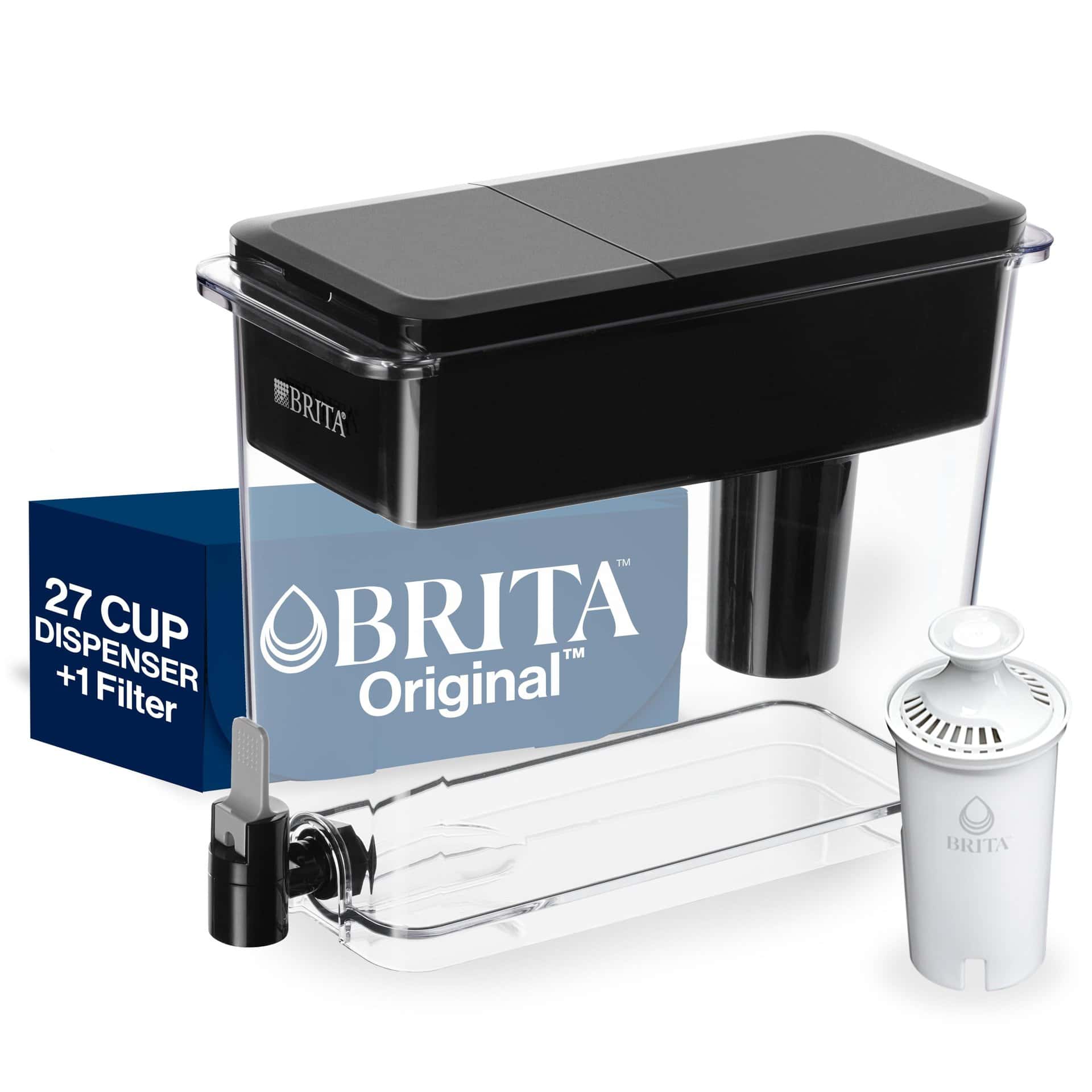
We believe the Brita UltraMax Water Dispenser is an excellent choice for anyone seeking convenient, filtered water at home.
Pros
- Large 27-cup capacity
- Reduces chlorine taste and odor
- Space-efficient design
Cons
- Rigid dispenser control
- Frequent filter replacements
- Potential for cracks if dropped
We’ve found the Brita UltraMax to be a game-changer in our kitchen. Its 27-cup capacity means we’re not constantly refilling it, which is a huge time-saver. The water tastes clean and refreshing, with the chlorine flavor noticeably reduced.
The dispenser fits nicely in our fridge, taking up minimal space. We appreciate the easy-locking lid and precision-pour spigot, which make it simple to get water without spills. The filter indicator is a handy feature, reminding us when it’s time for a replacement.
One downside we’ve noticed is the somewhat rigid dispenser control. It can be a bit stiff, occasionally causing it to snap back to the locked position. We’ve also had to be careful not to drop the unit, as we’ve heard of some cracking issues. Lastly, while the filter does a great job, we find ourselves replacing it every couple of months, which is an ongoing cost to consider.
Brita UltraMax Elite Dispenser
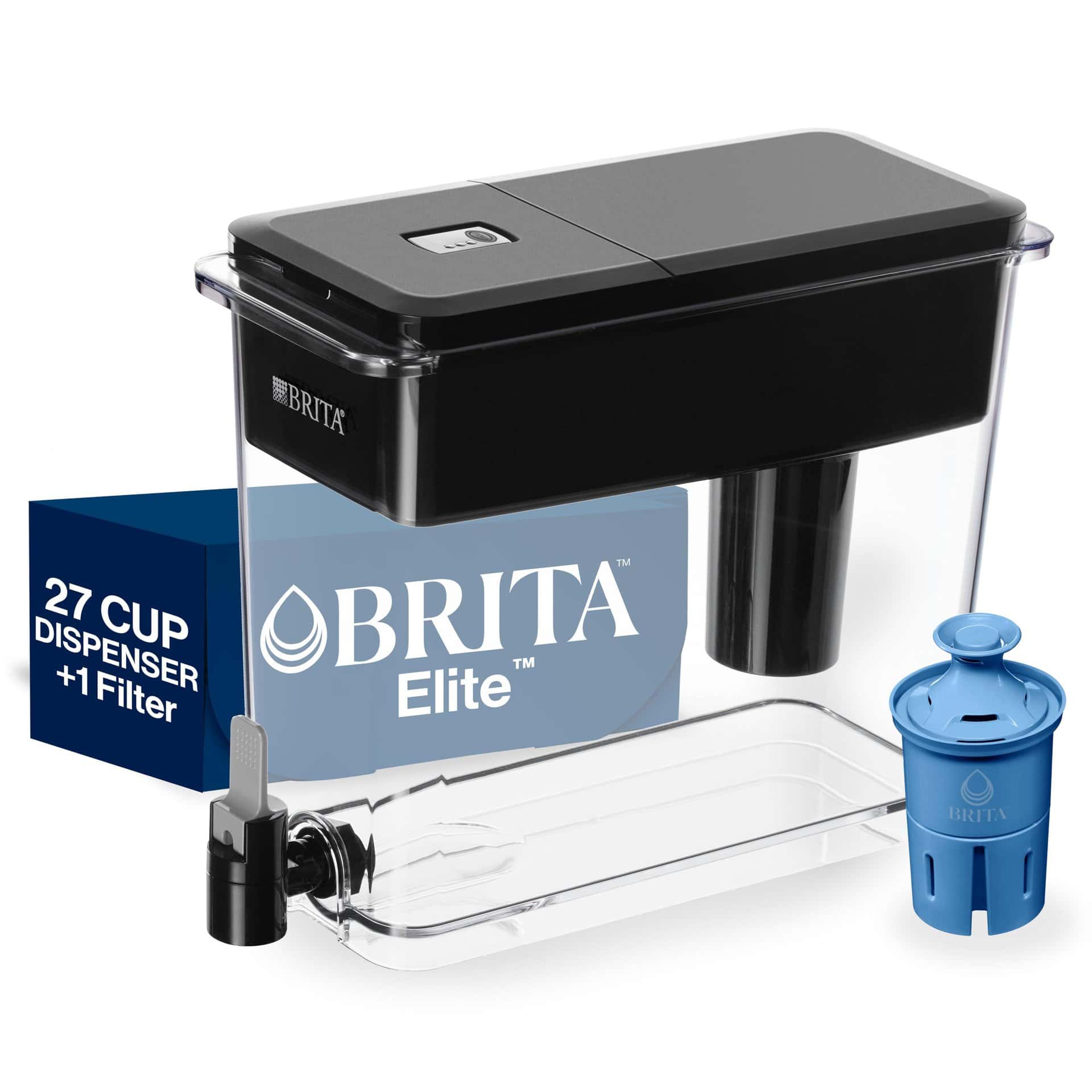
The Brita UltraMax Elite Dispenser offers great-tasting filtered water with impressive contaminant reduction capabilities.
Pros
- Large 27-cup capacity
- Reduces 30 contaminants including lead
- Space-efficient design
Cons
- Requires regular filter replacements
- Initial cost higher than basic pitchers
- May be too large for some refrigerators
We found the Brita UltraMax Elite Dispenser to be a game-changer for our daily water needs. Its 27-cup capacity means we rarely run out of filtered water, even with heavy use. The dispenser’s slim profile fits nicely in our fridge, maximizing space efficiency.
The Elite filter impressed us with its ability to reduce 30 contaminants, including lead and chlorine. We noticed a significant improvement in taste compared to tap water. The precision-pour spigot made it easy to fill glasses and water bottles without spills.
We appreciate the electronic filter indicator, which takes the guesswork out of replacement timing. While the initial cost is higher than basic pitchers, we’ve found it pays off in the long run by reducing our reliance on bottled water. The Brita UltraMax Elite Dispenser has become an essential part of our kitchen, providing clean, great-tasting water whenever we need it.
Brita Metro Water Filter Pitcher
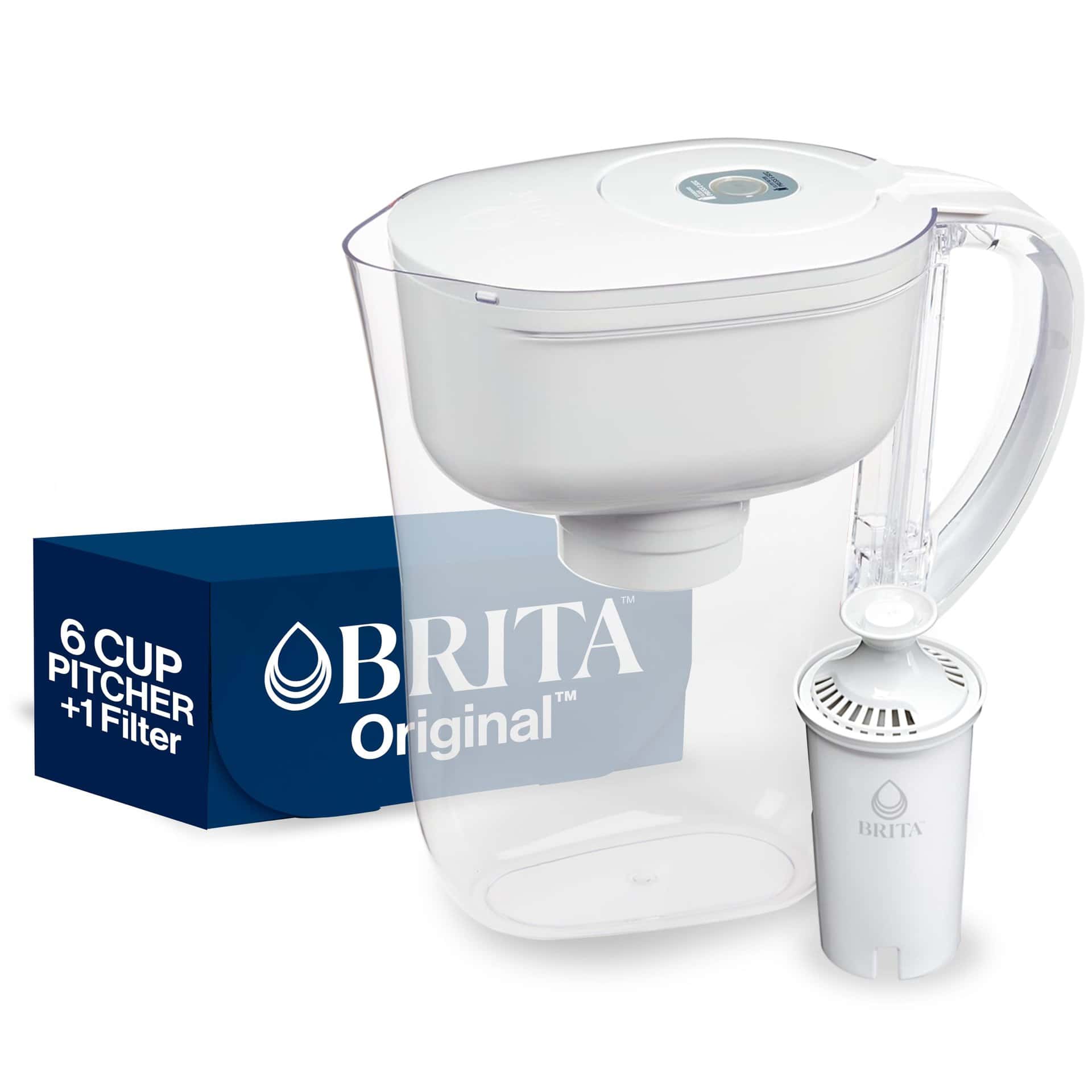
The Brita Metro Water Filter Pitcher is a compact and efficient solution for improving tap water taste and quality.
Pros
- Removes chlorine taste and odor
- Compact 6-cup design fits easily in refrigerators
- Electronic filter replacement indicator
Cons
- Requires frequent filter changes
- Small capacity may not suit larger households
- Plastic construction feels less durable than older models
We found the Brita Metro Water Filter Pitcher to be a handy addition to our kitchen. Its 6-cup capacity is perfect for small families or individuals. The pitcher fits nicely in our refrigerator door, saving valuable shelf space.
The filter does an excellent job of removing the chlorine taste and odor from our tap water. We noticed a significant improvement in the water’s taste immediately after using it. The easy-fill locking lid prevents spills and makes refilling a breeze.
One feature we appreciate is the electronic SmartLight filter indicator. It takes the guesswork out of when to replace the filter. The standard filter lasts about two months, which is reasonable for regular use.
We like that this pitcher is compatible with both Standard and Elite filters. The Elite filter lasts longer, which is convenient for those who don’t want to change filters as often. However, the initial cost is higher.
Using this pitcher has helped us reduce our reliance on single-use plastic water bottles. It’s an eco-friendly choice that aligns with our sustainability goals. The BPA-free plastic construction is a plus, though we noticed it feels less sturdy than older Brita models.
While the 6-cup capacity works well for us, larger households might find themselves refilling it frequently. For those who consume a lot of water daily, a larger model might be more suitable.
ZeroWater 32-Cup Ready-Read Dispenser
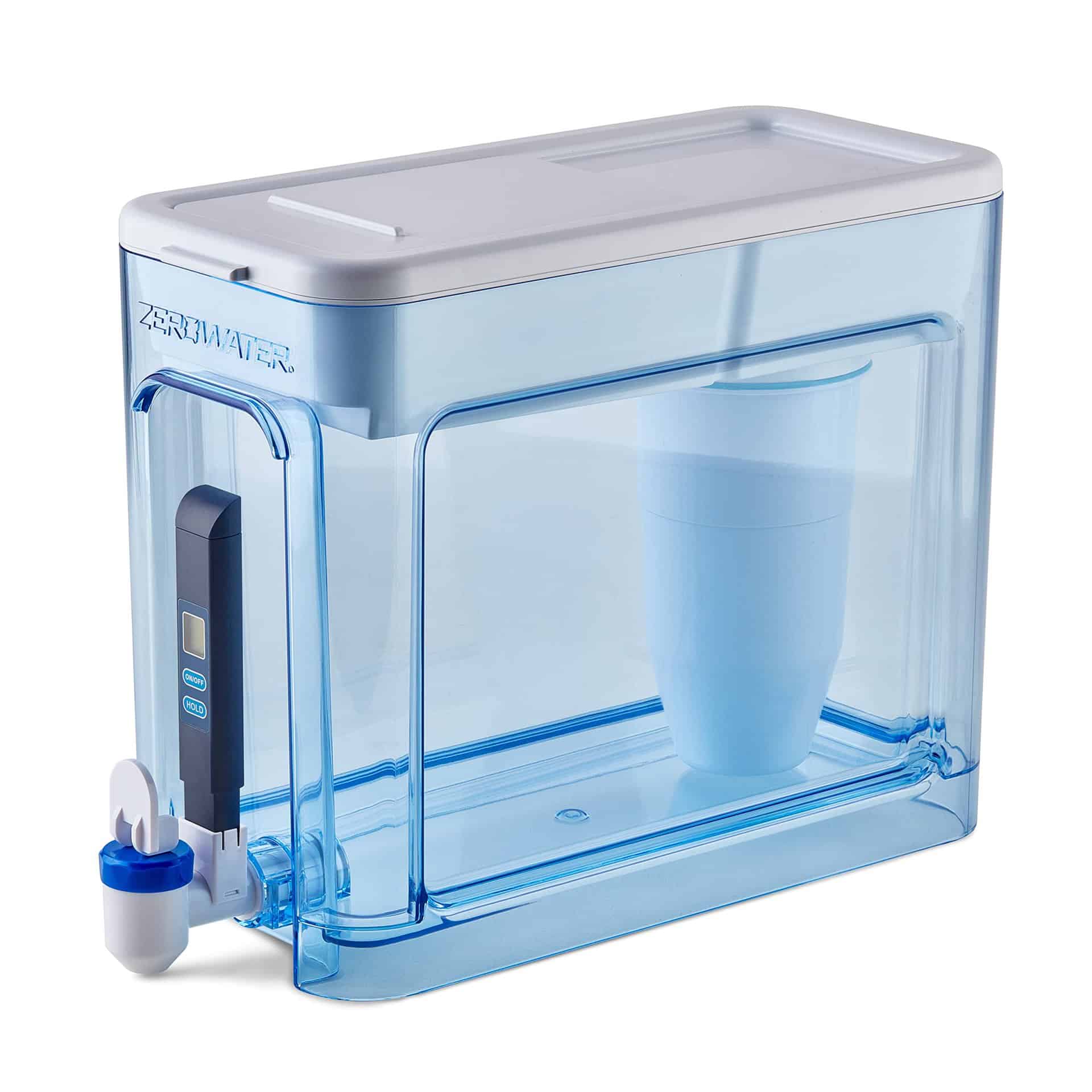
We highly recommend this water filter for its exceptional purification capabilities and user-friendly design.
Pros
- Removes virtually all dissolved solids
- Large 32-cup capacity
- Integrated TDS meter
Cons
- Filters may need frequent replacement
- Slower filtration process
- Higher upfront cost
We recently tested the ZeroWater 32-Cup Ready-Read Dispenser, and it’s a game-changer for clean drinking water. Its 5-stage filtration system effectively removes total dissolved solids (TDS), resulting in noticeably purer water. The integrated TDS meter is a standout feature, allowing us to check water quality instantly.
The 32-cup capacity is perfect for families or offices, reducing the need for constant refills. We found it fits well in most refrigerators, and its sleek design looks great on countertops. The spigot dispenses water smoothly, making it easy to fill glasses or water bottles.
One drawback we noticed is the slower filtration speed compared to other filters. This is likely due to its thorough purification process. The filters also tend to need replacement more frequently, especially in areas with hard water. Despite these minor issues, we believe the superior water quality makes the ZeroWater dispenser a worthwhile investment for health-conscious consumers.
Waterdrop 10UA Under Sink Filter
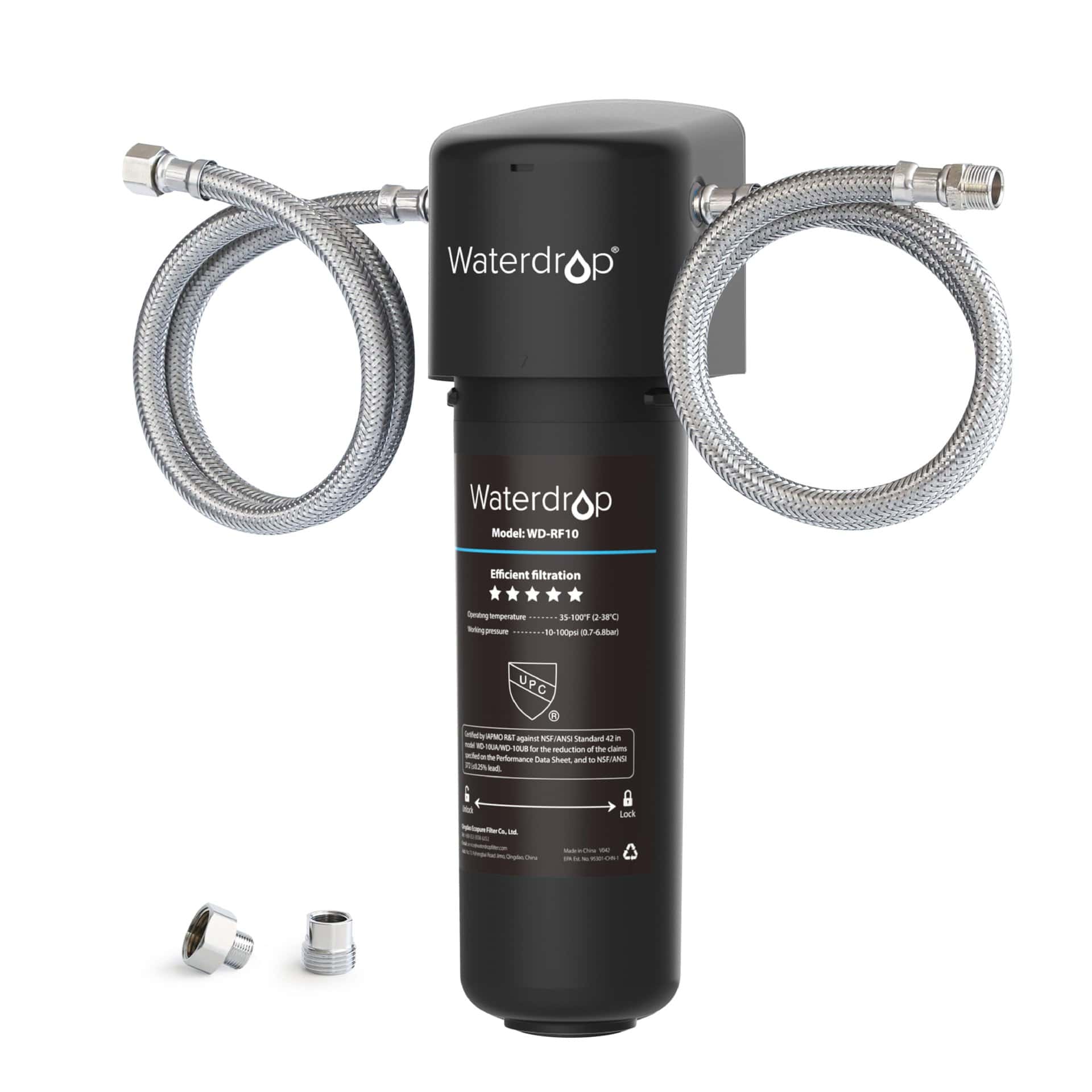
We highly recommend the Waterdrop 10UA for its effective filtration and easy installation.
Pros
- Reduces PFAS, PFOA/PFOS, and other contaminants
- Quick and easy installation
- Long-lasting filters (up to 12 months)
Cons
- Only for cold water use
- May slow water flow slightly
- Requires periodic filter replacement
The Waterdrop 10UA Under Sink Filter impressed us with its performance. We found it removed chlorine taste and odor effectively, making our tap water much more enjoyable. The installation process was a breeze, taking us less than 10 minutes to set up.
We appreciated the filter’s compact size, which didn’t take up much space under our sink. The twist-and-lock design made changing filters quick and simple. We noticed a significant improvement in water quality for both drinking and cooking.
The 8,000-gallon capacity meant we didn’t have to worry about frequent replacements. We liked that it’s certified against NSF/ANSI standards, giving us confidence in its filtration claims. The system’s versatility also stood out, as it can be used in various settings beyond just the kitchen.
Brita Everyday Elite Pitcher
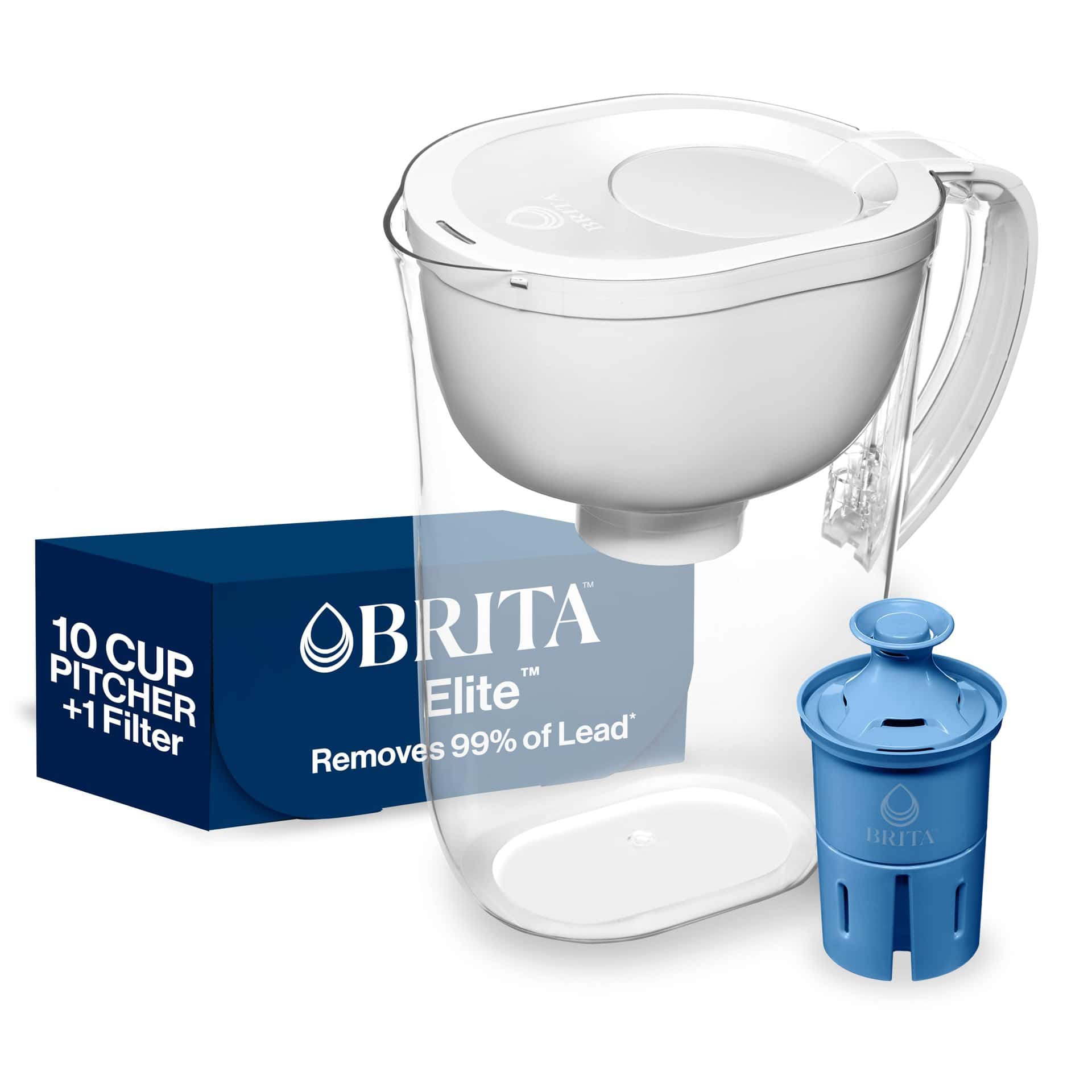
We recommend the Brita Everyday Elite Pitcher for its excellent filtration and user-friendly design.
Pros
- Removes 99% of lead and other contaminants
- Large 10-cup capacity
- SmartLight filter indicator
Cons
- Requires regular filter replacements
- May not fit in all refrigerator doors
- Initial setup can be time-consuming
We’ve been using the Brita Everyday Elite Pitcher for a while now, and it’s become an essential part of our daily routine. The 10-cup capacity is perfect for our family, providing enough filtered water throughout the day without constant refills.
The Elite filter truly impressed us with its ability to remove 99% of lead and other contaminants. We noticed a significant improvement in taste compared to our tap water. The water comes out crisp and clean, making it a pleasure to drink.
One feature we particularly appreciate is the SmartLight filter indicator. It takes the guesswork out of when to replace the filter, ensuring we always have the best quality water. The flip-top lid makes refilling a breeze, and we found the pitcher fits comfortably in our refrigerator.
While the initial setup took a bit of time, the ongoing maintenance is straightforward. We simply replace the filter every six months or so, depending on our usage. It’s worth noting that the cost of replacement filters should be factored into the long-term investment.
We’ve calculated that this pitcher has helped us reduce our plastic bottle usage significantly. It’s a small change that makes a big difference for the environment. The BPA-free construction also gives us peace of mind about the safety of our drinking water.
In our experience, the Brita Everyday Elite Pitcher offers a great balance of performance and convenience. It’s a reliable choice for anyone looking to improve their water quality at home.
ZeroWater 10-Cup Ready-Pour Pitcher
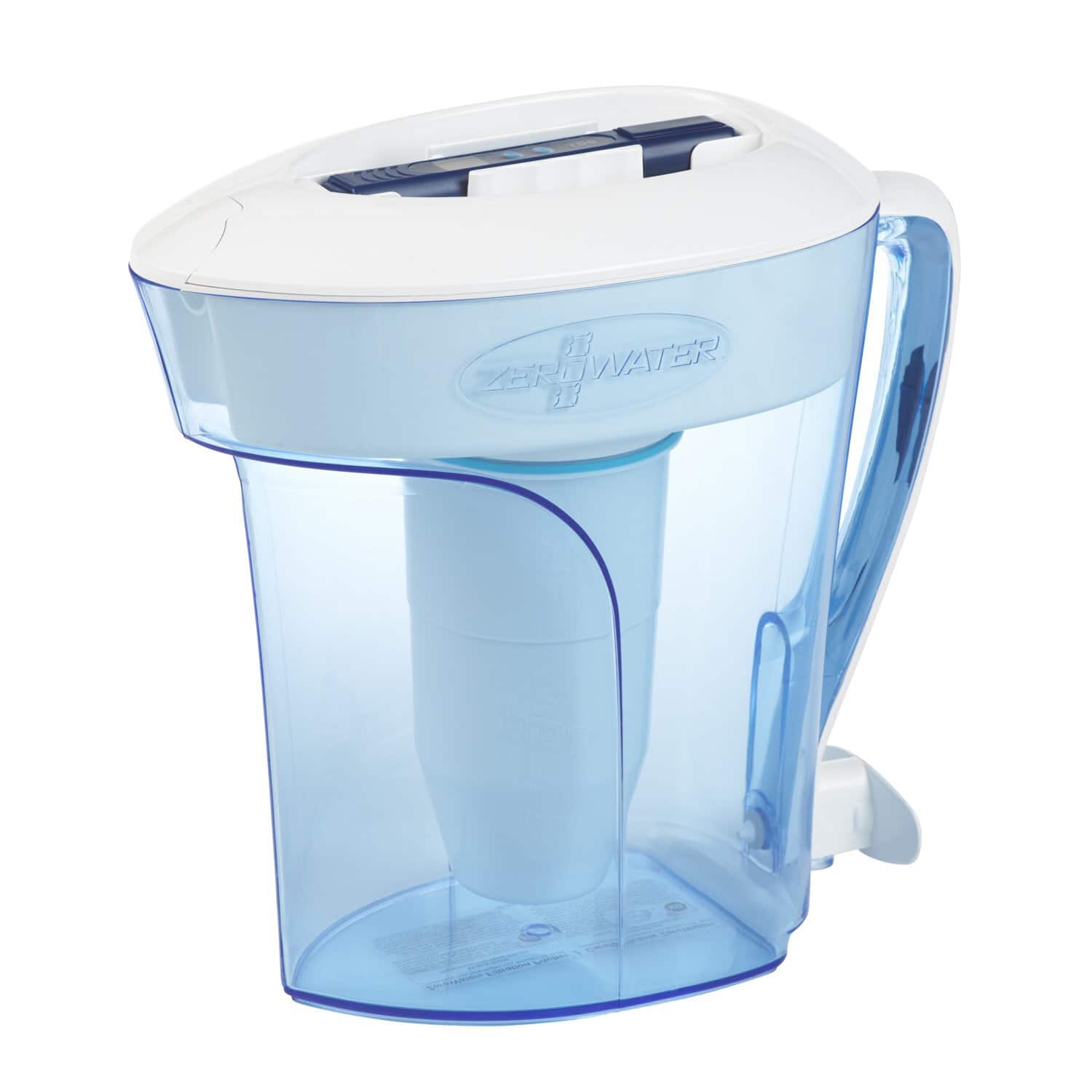
We recommend this ZeroWater pitcher for its exceptional filtration and convenient features.
Pros
- 5-stage filtration removes virtually all dissolved solids
- Includes TDS meter to check water purity
- IAPMO certified to reduce lead, PFOA/PFOS, and mercury
Cons
- Filters may need frequent replacement
- Slow water flow from dispenser spout
- Slightly bulky design for some refrigerators
We recently tested the ZeroWater 10-Cup Ready-Pour Pitcher, and it impressed us with its thorough filtration process. The 5-stage system effectively removed impurities, resulting in clean, great-tasting water. We particularly appreciated the included TDS meter, which allowed us to monitor the water quality and know exactly when to replace the filter.
The pitcher’s design is user-friendly, featuring a comfortable grip handle and a quick-fill spigot. We found it easy to refill and pour, though the dispenser spout’s flow was a bit slow for our liking. The 10-cup capacity was sufficient for our daily needs, but larger households might need to refill it more frequently.
We were pleased to learn that this pitcher is IAPMO certified to reduce harmful contaminants like lead, PFOA/PFOS, and mercury. It’s also made from BPA-free plastic, which gave us peace of mind. While the filters may require more frequent changes compared to some other brands, we believe the superior water quality justifies this minor inconvenience.
PUR PLUS Faucet Filter
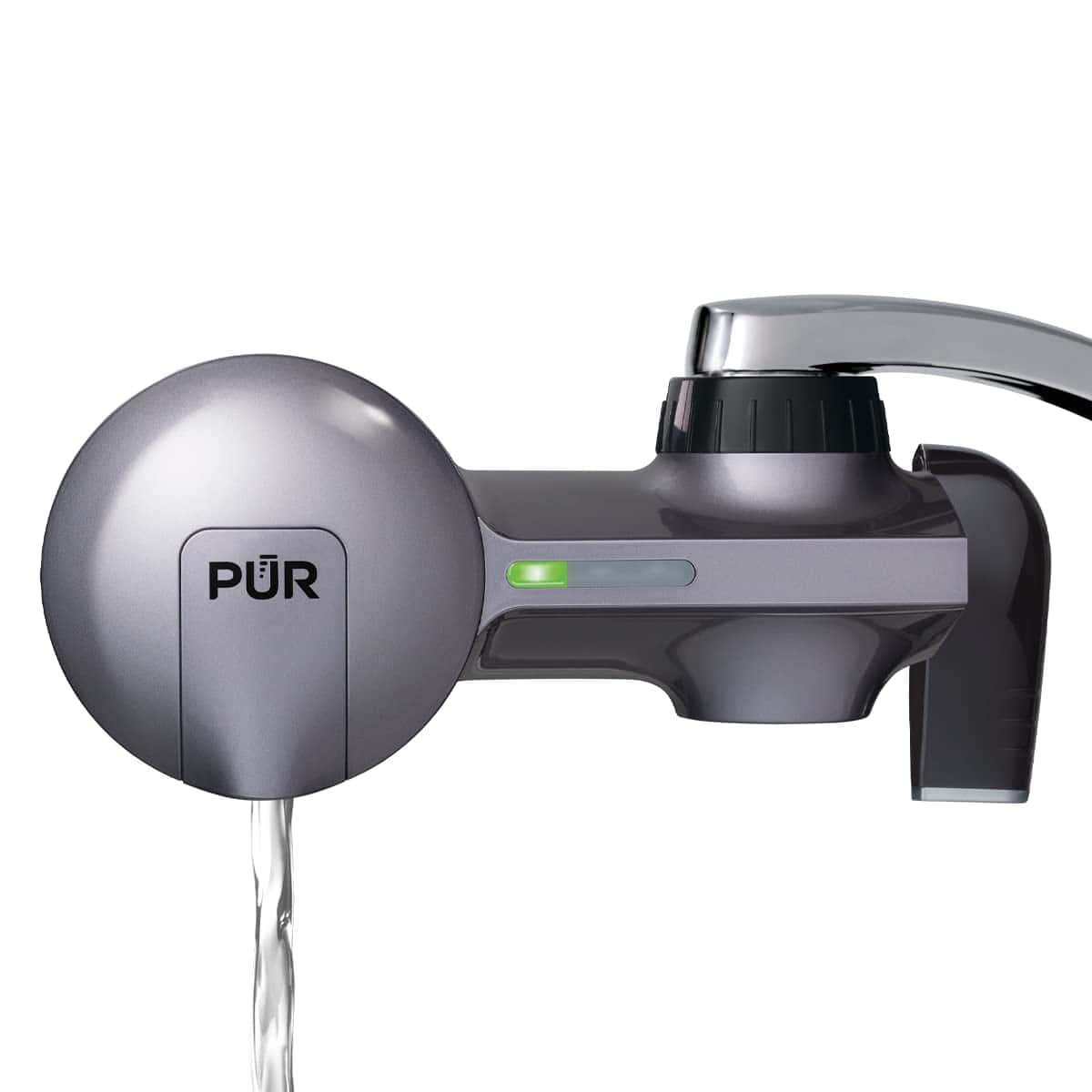
We recommend the PUR PLUS Faucet Filter for its superior filtration and ease of use.
Pros
- Reduces 70 contaminants
- Easy installation
- Filter change indicator
Cons
- May not fit all faucets
- Slower water flow
- Regular filter replacements needed
We’ve been using the PUR PLUS Faucet Filter in our kitchen for several weeks now. The installation process was a breeze. We simply screwed it onto our faucet without any tools. The metallic grey finish looks sleek and modern on our sink.
The filter’s performance has impressed us. Our tap water tastes noticeably cleaner and fresher. We love that it reduces 70 contaminants, including lead and microplastics. The on/off lever is convenient for switching between filtered and unfiltered water.
One minor drawback we noticed is a slightly reduced water flow when the filter is engaged. However, this is a small trade-off for the improved water quality. The filter change indicator is helpful, reminding us when it’s time for a replacement. We’ve found this system to be a cost-effective alternative to buying bottled water.
iSpring RO System
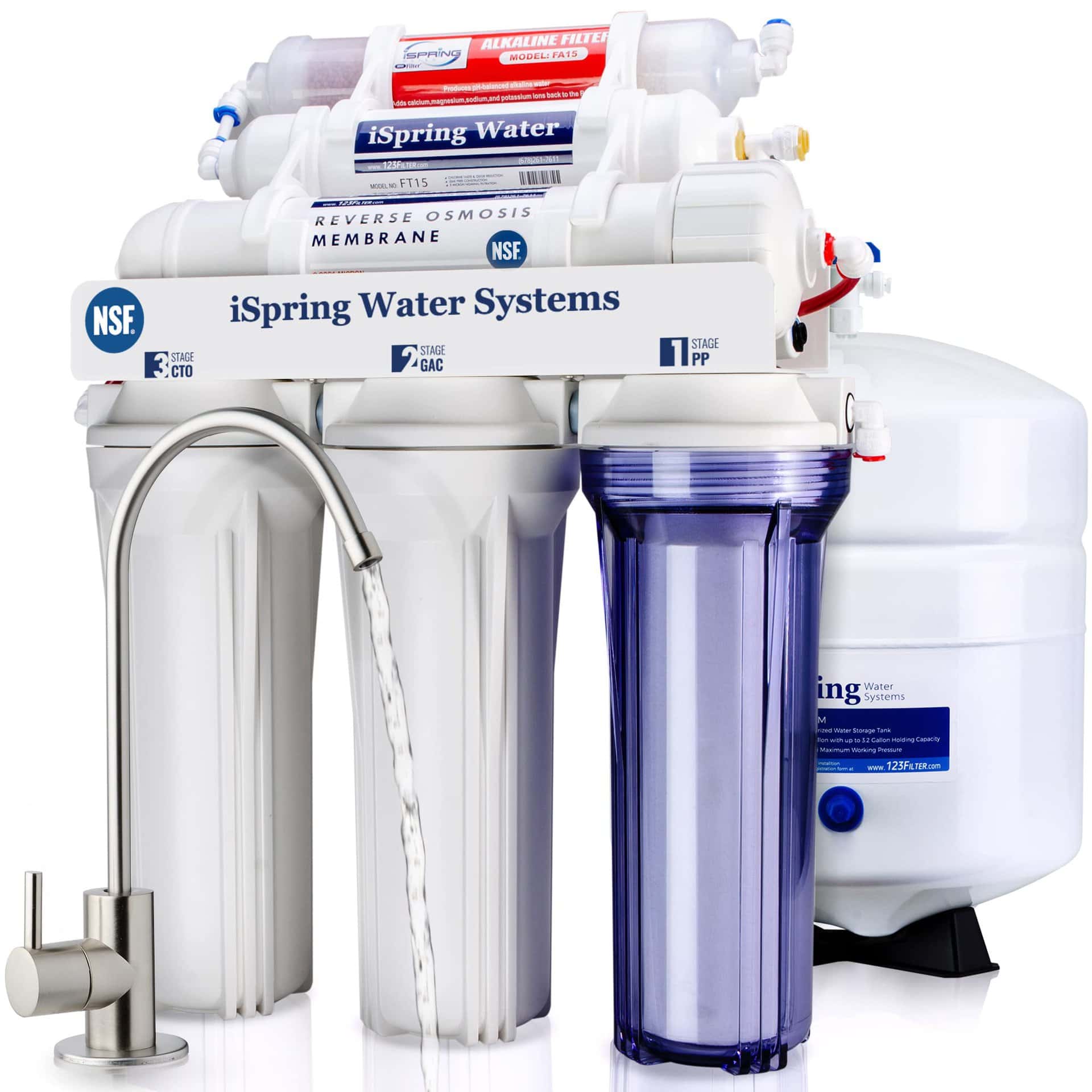
We highly recommend this iSpring RO system for its exceptional water purification and remineralization capabilities.
Pros
- NSF/ANSI 58 certified for contaminant removal
- 6-stage filtration with alkaline remineralization
- Easy DIY installation with clear instructions
Cons
- Requires under-sink space
- Initial setup may take time
- Regular filter replacements needed
We installed the iSpring RCC7AK under our kitchen sink last month. The setup process was straightforward, taking about two hours. The instructions were clear, and all necessary parts were included.
The water quality improvement was immediately noticeable. Our tap water now tastes crisp and clean, without any chlorine odor. We appreciate the alkaline remineralization stage, which adds back beneficial minerals and balances the pH.
This system efficiently removes a wide range of contaminants. It gives us peace of mind knowing our drinking water is free from harmful substances like lead, fluoride, and PFAS. The transparent first stage housing allows easy monitoring of sediment buildup.
We’ve found the water flow to be consistent and adequate for our daily needs. The system produces up to 75 gallons per day, which is more than sufficient for our household. Maintenance seems manageable, with long-lasting filters that don’t require frequent changes.
Overall, we’re impressed with the iSpring RCC7AK. It delivers on its promise of clean, great-tasting water. The NSF certification adds an extra layer of trust in its performance. For anyone looking to improve their water quality at home, this system is a solid choice.
Buying Guide
Selecting the best water filter requires careful consideration of several key factors. We’ve compiled a helpful guide to assist you in making an informed decision.
Contaminant Removal
Different filters target specific contaminants. Check your local water quality report to identify which impurities need removal.
| Contaminant Type | Common Examples |
|---|---|
| Chemical | Chlorine, lead |
| Biological | Bacteria, cysts |
| Physical | Sediment, rust |
Filter Type
Choose a filter type that suits your needs and living situation.
- Pitcher filters: Affordable, portable
- Faucet-mounted: Easy installation, convenient
- Under-sink: High capacity, out of sight
- Whole-house: Comprehensive filtration
Certification
Look for filters certified by reputable organizations. NSF International and the Water Quality Association provide trustworthy certifications.
Capacity and Flow Rate
Consider how much filtered water you need daily. Higher capacity filters require less frequent changes but may have slower flow rates.
Maintenance
Factor in the cost and frequency of filter replacements. Some systems need more upkeep than others.
Installation
Assess your DIY skills. Some filters are simple to install, while others may require professional help.
We recommend comparing these features across different options to find the best water filter for your home. Remember to balance your budget with your filtration needs for the most satisfying choice.
Frequently Asked Questions
Water filters come in various types, each with unique features and capabilities. Let’s address some common questions about choosing and using water filters effectively.
What is the most effective type of water filter?
Reverse osmosis systems are highly effective. They remove up to 99% of contaminants, including heavy metals and microorganisms. These systems use a semi-permeable membrane to filter water at the molecular level.
Carbon filters are also quite effective. They excel at removing chlorine, sediment, and organic compounds. Many households find them sufficient for improving taste and odor.
What is the healthiest way to filter tap water?
Multi-stage filtration systems offer the healthiest approach. They combine different filter types to tackle a wide range of contaminants. A typical setup might include:
- Sediment filter
- Activated carbon filter
- Reverse osmosis membrane
This comprehensive approach ensures the removal of particles, chemicals, and microorganisms.
Which is better, Pur or Brita?
Both Pur and Brita offer reliable water filtration options. Pur tends to remove more contaminants, including lead and mercury. Brita excels at improving taste and odor.
Pur filters typically last longer, reducing replacement frequency. Brita pitchers are often more affordable upfront.
We recommend Pur for households concerned about specific contaminants. Brita is a solid choice for those primarily focused on taste improvement.
What water filter removes the highest number of contaminants?
Reverse osmosis systems remove the most contaminants. They can eliminate up to 99% of:
- Dissolved solids
- Heavy metals
- Microorganisms
- Chemicals
Some advanced models also include UV sterilization for added protection against bacteria and viruses.
How do you choose the best water filter pitcher for your needs?
Consider these factors when selecting a water filter pitcher:
- Contaminant removal: Check which pollutants the filter targets.
- Capacity: Choose a size that suits your household’s water consumption.
- Filter lifespan: Look for pitchers with long-lasting filters to reduce maintenance.
- Certifications: NSF or WQA certifications ensure performance claims are verified.
Test your tap water to identify specific contaminants. This helps you select a pitcher that addresses your unique water quality issues.
What are the best water filter systems for backpacking?
For backpacking, we recommend lightweight and portable options:
- Squeeze filters: Easy to use and effective against bacteria and protozoa.
- Straw filters: Convenient for drinking directly from water sources.
- Gravity filters: Ideal for filtering large quantities at camp.
Look for filters that meet EPA standards for removing waterborne pathogens. Consider the filter’s weight, flow rate, and longevity when choosing a backpacking water filter.

